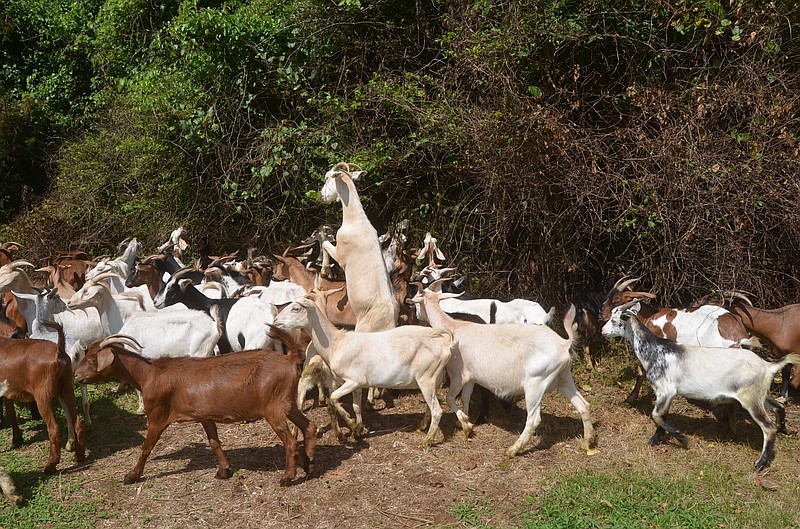MURFREESBORO, Tenn. (AP) - In hopes of renovating a historic cemetery that lies neglected under dense vegetation, Murfreesboro land owner Bob Davidson decided to use an organic method.
He hired goats.
"This is the old graveyard. We're having the Goat Guys comes and clean up some of this," said Davidson, pointing to tombstones strewn on the ground as dozens of goats hopped up and over them to get the greenery.
One of the tombstones belongs to Burrell Gannaway, one of Murfreesboro's first city leaders who owned a large plantation in what is known as the Barfield Community. The Gannaway cemetery was the topic of a story last year after a local man traced the roots of his slave ancestors back to the family.
"The groundhogs kind of messed up the foundation and toppled everything over," explained Davidson, motioning to the strewn array of stones. "But we're going to get it cleaned up and we're going to try to renovate it as much as we can."
Herd mentality
Around 60 goats trampled in and around the thick grove of invasive plants such as privet, honeysuckle vines, bamboo and poison ivy that surrounds a collection pond.
"The goats are munching away," said Josh Delozier, co-owner of the Goat Guys, a natural brush removal service based in Franklin.
When Delozier first lets the goats off the trailer, the herd makes a bee line for the green, often bumping into each other as they vie for the best spot.
"Let's go ladies," Delozier called and motioned to the herd, which is comprised mostly of adult females with a few baby goats. "They love the honeysuckle and the privet and they want to be the first one to get it to, no matter what."
The herd will graze for at least 12 hours a day, Delozier said.
"Once they get full, they'll lay down together and chew their cud, then they'll get back up and go back to it," Delozier said.
Delozier leaves the herd on site for multiple days, depending on the size of the property and vegetation density. A portable electrified fence surrounds the property where the herd grazes, keeping the goats in and the coyotes out.
In just a few days, this overgrown patch behind Davidson's home will look like wintertime, Delozier said.
Go green
"They'll munch anything green and leafy. . There won't be anything green up to 6 feet tall," Delozier explained as his goats darted around him as he stood in the middle of the drained pond.
Right now is the best time to get the goats, as many of the invasive species are going to seed.
"(The goats) actually sterilize the seeds when they pass through their systems," Delozier said.
Davidson sees the goat service as a win-win. The goats get to eat their favorite treats and he doesn't have to wrestle for days on end trying to clear out impossibly thick vegetation.
"We're able to bring the goats in and clear out terrain that is really hard to manage, and we can do it in an ecological and sustainable way instead of just putting poisons on it and hurting out land. We can take care of it and nurture it in the right manner," Delozier said, patting one of the goats on the head. "And they are cute and it's fun."
